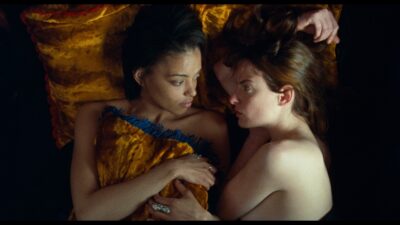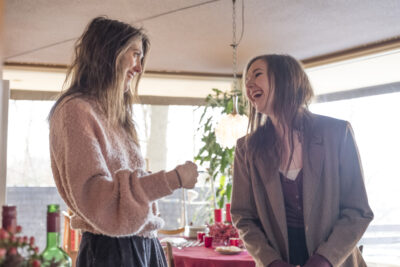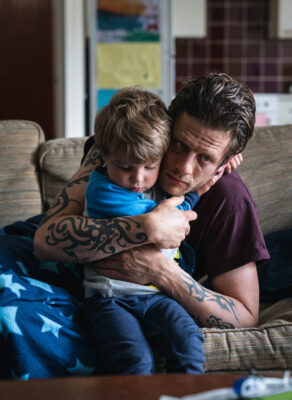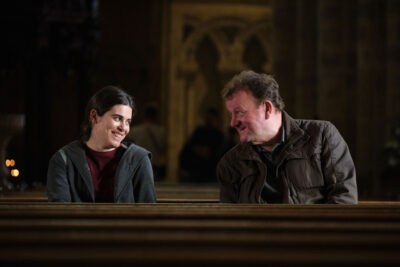We’re proud to soon screen two films by Canadian filmmaker Patricia Rozema: her just-restored 1995 romance When Night is Falling (May 7 at the Royal and May 8 at the NoHo) and her most recent film, Mouthpiece (May 13 & 14 at the Town Center, Monica Film Center, Glendale, and Claremont). Rozema will participate in Q&As after the Tuesday, May 7 and 8 screenings of When Night is Falling at the Royal and NoHo. Tracy E. Gilchrist, VP, Executive Producer of Entertainment for equalpride, will moderate the Royal Q&A.
Long considered to be a pivotal entry in the LGTBQ+ canon, When Night is Falling is a sexy, daring and visually resplendent story about the thrilling temptations of passion. Camille, a Christian academic, is engaged to Martin, a fellow theologian. Then she meets Petra, a flamboyant performer in an avant-garde circus. To her surprise, Camille finds herself falling deeply and almost magically in love. Forced to choose between the woman she wants, and the man who loves her, Camille discovers that the only true duty of the soul is desire.

A Canadian classic that was in Official Competition at the 1995 Berlin International Film Festival, When Night is Falling tells a lesbian story beautifully photographed by Douglas Koch, catching a romantic, wintry Toronto landscape.
Adapted from the play by Amy Nostbakken and Norah Sadava, Mouthpiece follows Cassandra, an aspiring writer who, while struggling to compose a eulogy after the sudden death of her mother, comes to discover that her own rebelliousness is as much a response to the male gaze as her mother’s conformity. Enacting the two sides of Cassandra’s conflicting inner dialogue, playwright-performers Nostbakken and Sadava create a compelling portrayal of the tension between regression and progress that is often found within women.

Mark Olson of the L.A. Times just published a good piece about Rozema and her work and also interviewed her, as did Gilchrist for The Advocate:
There’s a scene in Patricia Rozema’s 2018 film Mouthpiece where the main character, Cassandra, is flooded with a memory of her mother, who’s just died. The camera pans the room, lingering on Cassandra’s mother’s books and music. In the frame there appear works by Joni Mitchell, Margaret Atwood, Alice Munro, and the groundbreaking lesbian author, actor, and activist Ann-Marie McDonald, who appeared in Rozema’s first feature, 1987’s I’ve Heard the Mermaids Singing. Through Cassandra’s memories of her mother, Rozema pays tribute to Canada’s great women storytellers, and considering the filmmaker’s body of work, her name belongs among them…Throughout her canon and evident in the restored films is Rozema’s singular poetic film language that includes queer identity, interior monologues, and a duality in her characters or what she refers to as “twoness.” Unburdened by the machine of Hollywood and working from artists’ grants from Canada, Rozema cemented herself as a true auteur out of the gate with I’ve Heard the Mermaids Singing, a self-reflexive and heartfelt comedy about a quirky secretary to a lesbian art gallery owner. The film investigates the nature of art itself, something that Rozema would continue to examine throughout her career.
“But I think I was protecting my ability to make movies, because I was ambitious too. Not for fame or for money but for being able to make movies, which is the best job in the whole fucking world in my mind,” she adds. “I was terrified that I would be shut down. So I was careful, maybe too careful sometimes, so that I think some people wished was different sooner.”
Despite Rozema’s thoughts of being “too careful” at some points, as a progenitor of the Toronto New Wave with the likes of Atom Egoyan and Jeremy Podeswa, her contributions to cinema include making elevated films about queer women with happy or hopeful endings that expanded the notion of fixed sexuality.
“I also spoke quite early about fluidity, a gender continuum, and a sort of orientation continuum,” Rozema says. “At the time, it was very binary: You’re gay or you’re straight. Period. I felt like there’s got to be more colors in this human palette.”


